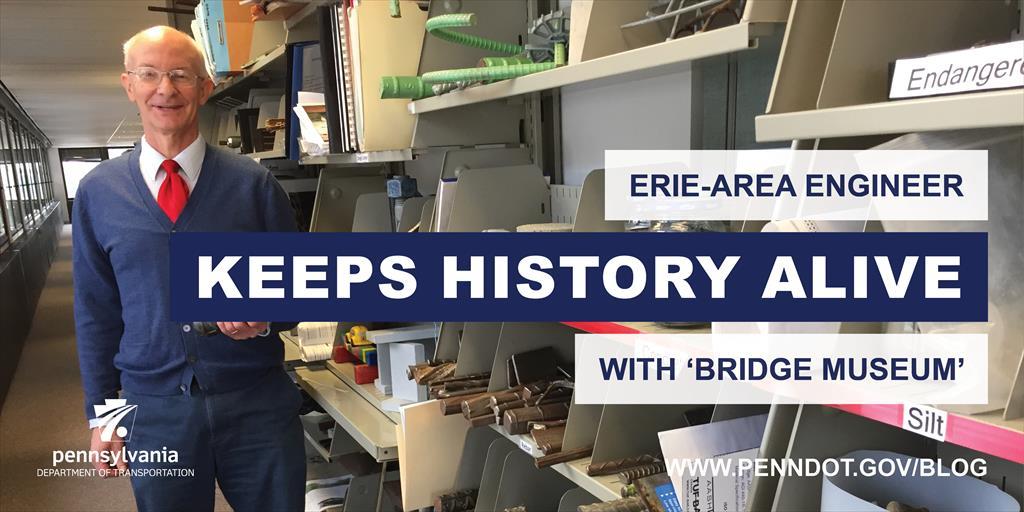
As the bridge engineer for PennDOT's northwest region, William "Bill" Koller, P.E., talks about his work with ease and conviction, and oftentimes an analogy.
"I am the general in the bridge unit," Koller explained. "I take the battlefield reports — bridge inspections — and figure out what to do to maintain and improve the bridge system."
Koller also is the curator and historian of PennDOT District 1's unofficial "Bridge Museum." The area outside Bill's office is stuffed with artifacts from replaced and rehabilitated bridges from across the six-county area of District 1, which includes Crawford, Erie, Forest, Mercer, Venango, and Warren counties.
The items are sometimes donated by contractors who are rehabbing or demolishing state-owned bridges. Other items come from bridge work done by the PennDOT maintenance crews.
Koller uses the collection of items to make presentations, demonstrate construction principles or issues, and develop new ideas.
"We have so many unique bridges in District 1, some historic. It is a challenge to creatively upgrade them to current standards and loads," he said. "There are no rehabilitation manuals for these bridges, so it takes engineering principles, innovation, and new materials to make these bridges last another 50 years or more."
And if the solution involves major rehabilitation or replacement, then Koller often grabs a piece of the structure not slated for reuse and adds it to his museum.
The museum is also used to help train new employees in the bridge unit.
"Trainees are given plans of different bridges and they have to find the associated materials in the displays along with answers to a questionnaire booklet," Koller said. "This discovery learning saves time during the training process and serves as a thorough introduction to the bridge system and design."
The museum is just one of the aspects of his work Koller enjoys.
"I like seeing the fruits of our labor and the team effort it takes to improve the bridge system," he said.
Koller is proud of the district's work to produce bridge beams in house as well as its efforts toward developing innovative bridge components.
"All this is because we had the benefit of Transportation Secretary Tom Larson's genius in turning the department around and setting it on the right path," he said. "Our District Executives, starting with Jack Baker, advanced the Larson legacy in creating a work environment where employees can thrive."
With 36 years of experience with PennDOT District 1, Koller has the advantage of seeing the department develop and change over the years.
Among his past assignments was the Design IT Coordinator when personal computers were new in the department.
"Typical of a new field – assign it to related title until it becomes a big enough work load to justify a new position, or in this case, a whole new unit," Koller said with a smile.
"I remember my grandfather saying, often, how amazed he was to see the development of technology during his lifetime, he was born in 1892. Now I see the same thing and it is amazing."
Reminiscing and relating historical facts — those are well-known personality traits of the longtime PennDOT employee who is generous with the titles of books he has read and back-road directions to destinations around the district.
But what many might not know is that in his younger years he helped his father build a campground.
"I learned plumbing, carpentry, electrical wiring, surveying, sewage systems construction, welding, and customer relations," he explained. "I got to run a backhoe, ditcher, loader, bulldozer, tractor, mowers, and develop a love of maps, building things and travel — what great preparation for civil engineering."
ABOUT THIS BLOG
Did you know PennDOT is directly responsible for nearly 40,000 miles of highway and roughly 25,000 bridges? We oversee programs and policies affecting highways, urban and rural public transportation, airports, railroads, ports and waterways, in addition to administering the state's more than 11 million vehicle registrations and 8.8 million driver's licenses.
So, how do we do what we do? And how can we help you travel in Pennsylvania — whether it be for business or leisure — in safe and enjoyable manner? Read PennDOT Way to learn more about the department, what we do, and how and why we do it.
TAGS
50-Year Anniversary, 511PA, Aggressive Driving, Airports, Autonomous Vehicles, Bicycles, Bridges, Child Safety, Community Relations, Construction, COVID-19, Distracted Driving, District 1, District 10, District 11, District 12, District 2, District 3, District 4, District 5, District 6, District 8, District 9, DOTcom, Driver and Vehicle Services, Emergency Responders, Employment, Equity, FAQ Friday, Human Trafficking, Impaired Driving, Innovations, Live Free Ride Alive, Maintenance Monday, Motorcycles, Older Drivers, PA Motorcycle Safety Program, Pedestrians, PennDOT Connects, Ports, Public Transit, Railroads, REAL ID, Road MaP, Roadside Beautification, Rural Roads, Safety, School Buses, Seat Belts, State Transportation Innovation Council (STIC), Sustainability, Teen Drivers, Throwback Thursday, Transportation Funding, Travel in PA, Welcome Centers, Winter, Work Smart, Work Zone, Yellow Dot
LATEST POSTS
PennDOT Continues Sharing, Updating Resources for Local Governments to Pursue Bipartisan Infrastructure Law Funding Opportunities
Norwin High School Wins 2024 ‘Innovations Challenge’
Demo Complete: I-95 CAP Project in Center City Philadelphia
PennDOT Archeologist Connects Past, Present, and Future
Lehigh Valley DUI, Highway Safety Task Force Hosts Law Enforcement Seminar
ARCHIVES
2024
2023
2022
2021
2020
2019
2018
2017

